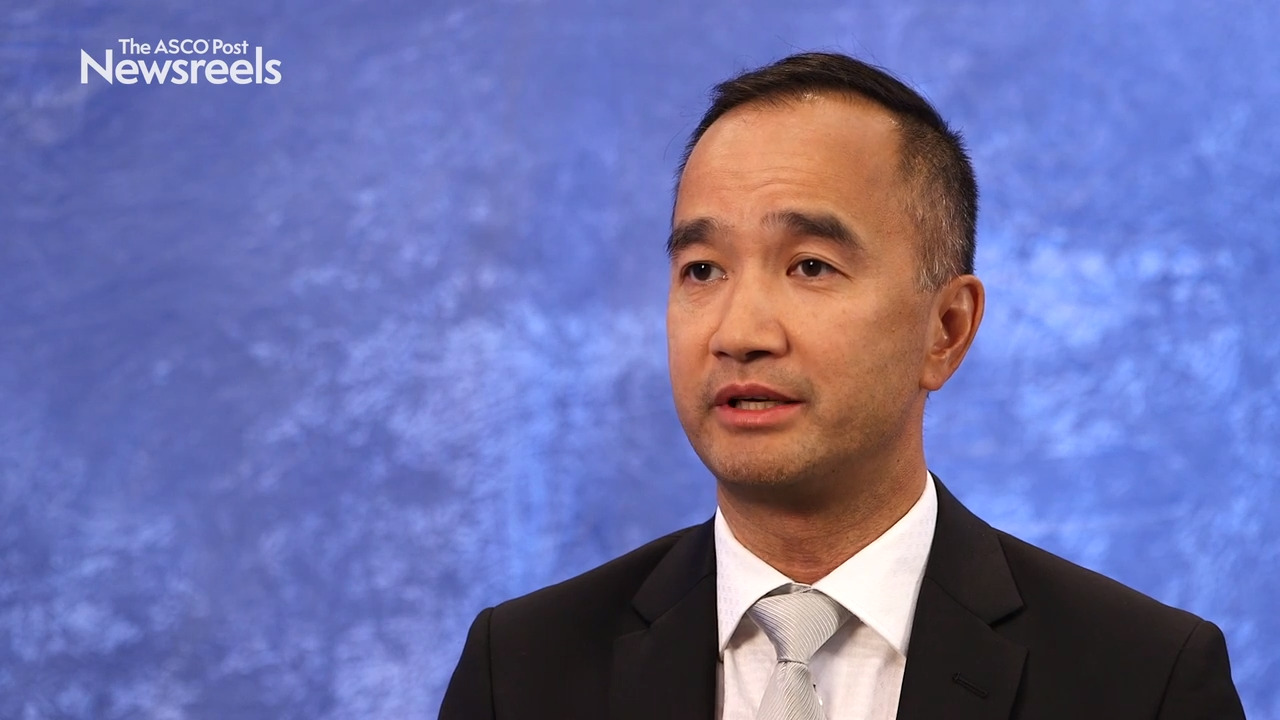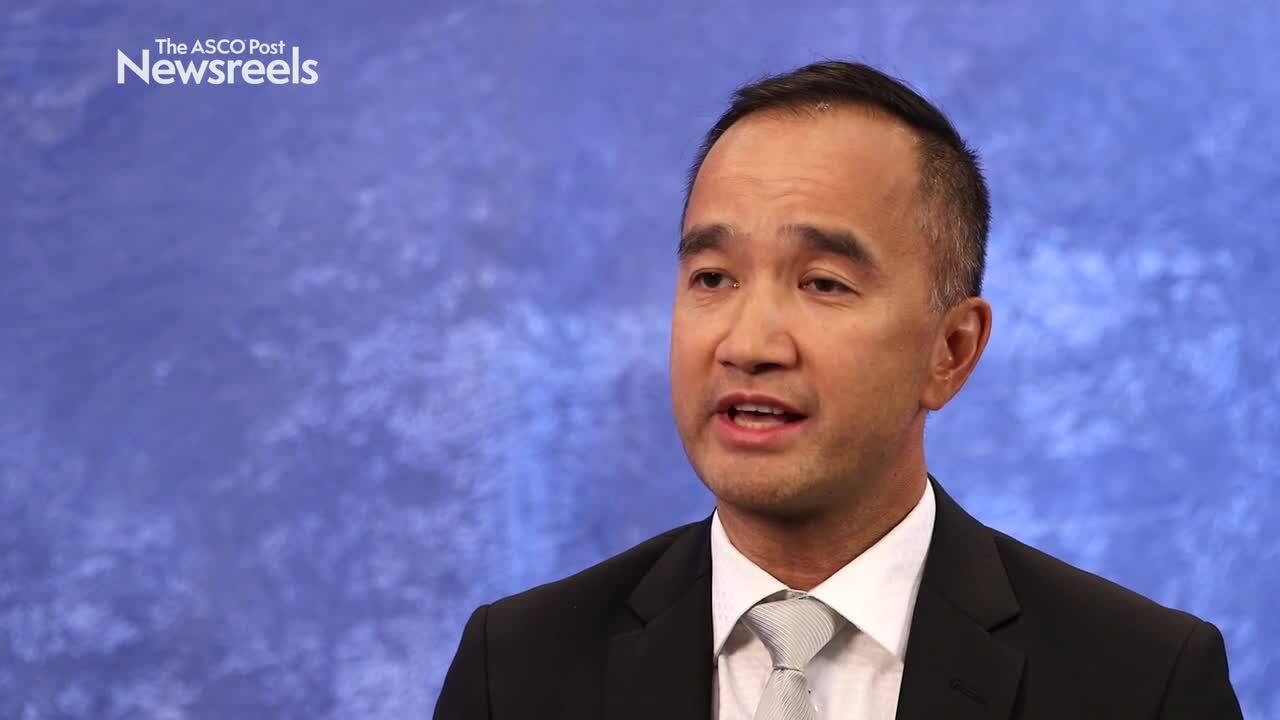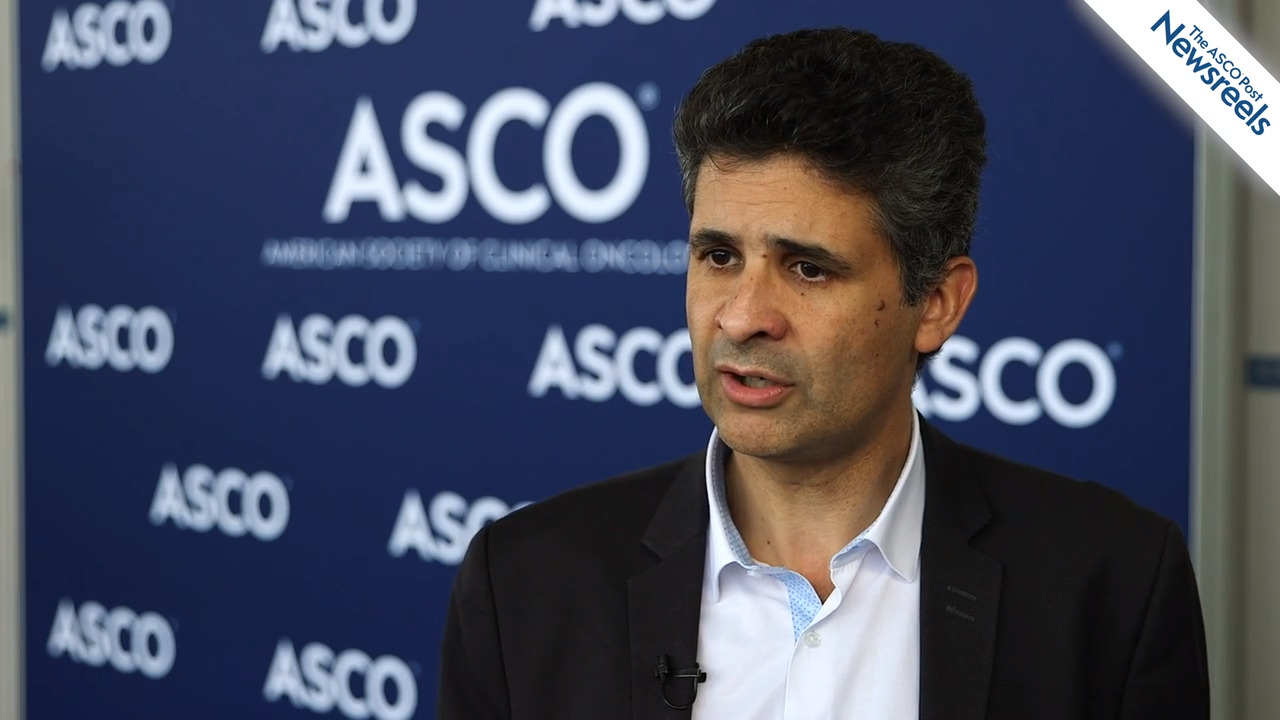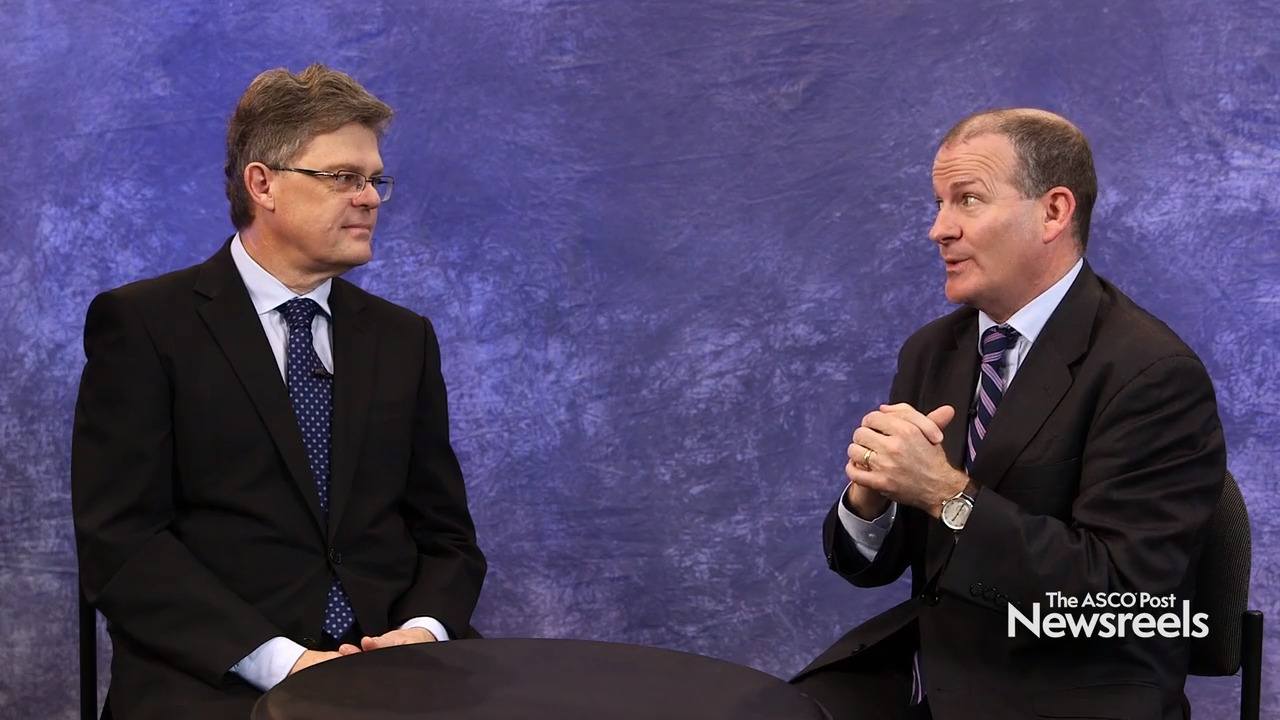Enzalutamide Improves Survival vs Standard First-Line Treatment in Hormone-Sensitive Metastatic Prostate Cancer
As reported in The New England Journal of Medicine by Ian D. Davis, MBBS, PhD, FRACP, FAChPM, of Monash University and Eastern Health in Melbourne, and colleagues, the phase III ENZAMET trial has shown that the androgen receptor inhibitor enzalutamide improved progression-free and overall survival ...
Novel Treatments Under Study in Renal Cell Carcinoma and Prostate Cancer
There were numerous notable presentations at the 2019 Genitourinary Cancers Symposium, many of which were covered in The ASCO Post over the past few months. To add to our continued coverage of this meeting, here are some highlights from studies focusing on novel therapeutics in renal cell carcinoma ...
Looking at Prostate Cancer–Specific Mortality by Gleason Score and Race
Black men suffer disproportionately from prostate cancer, both in terms of incidence and mortality, compared with their white counterparts. However, a newer study conducted by investigators at the University of California, San Francisco, and Dana-Farber Cancer Institute, Boston, found that black...
Darolutamide for Nonmetastatic Castration-Resistant Prostate Cancer
On July 30, 2019, darolutamide was approved for the treatment of patients with nonmetastatic castration-resistant prostate cancer.1,2 Approval was based on findings in the double-blind phase III ARAMIS trial (ClinicalTrials.gov identifier NCT02200614), in which 1,509 patients were randomly assigned ...
Novel Treatments Under Study in Renal Cell Carcinoma and Prostate Cancer
There were numerous notable presentations at the 2019 Genitourinary Cancers Symposium, many of which were covered in The ASCO Post over the past few months. To add to our continued coverage of this meeting, here are some highlights from studies focusing on novel therapeutics in renal cell carcinoma ...
FDA Approves Darolutamide for Nonmetastatic Castration-Resistant Prostate Cancer
ON JULY 30, the U.S. Food and Drug Administration (FDA) approved darolutamide (Nubeqa) for the treatment of nonmetastatic castration-resistant prostate cancer. Approval was based on the ARAMIS study, a multicenter, double-blind, placebo-controlled clinical trial of 1,509 patients with nonmetastatic ...
FDA Pipeline: Priority Reviews in Prostate Cancer, Mantle Cell Lymphoma
This week, the U.S. Food and Drug Administration (FDA) accepted new drug applications for enzalutamide in metastatic hormone-sensitive prostate cancer and zanubrutinib in relapsed or refractory mantle cell lymphoma, and granted both applications Priority Review. Priority Review for Enzalutamide in ...
Mortality Risk for Patients With Preexisting Cardiovascular Conditions Treated With Abiraterone Acetate or Enzalutamide
A new population-based study showed that novel oral androgen signaling–inhibitor therapies may be associated with an increased risk of death in patients with preexisting cardiovascular conditions. The research was published by Lu-Yao et al in European Urology. “Data from published ...
FDA Pipeline: Designation in CLL, New Drug Application in GIST, New Prostate Ablation System Receives 510(k) Clearance
Recently, the U.S. Food and Drug Administration granted Breakthrough Therapy designation to acalabrutinib in chronic lymphocytic leukemia (CLL), accepted a new drug application for avapritinib in some types of gastrointestinal stromal tumors (GIST), and granted 501(k) clearance to market the...
FDA Review Finds No Increased Risk of Prostate Cancer With Parkinson's Disease Treatments Containing Entacapone
A U.S. Food and Drug Administration (FDA) review of additional data found no increased risk of prostate cancer with the use of entacapone to treat Parkinson’s disease. The FDA conducted this review after an earlier trial—the Stalevo Reduction in Dyskinesia Evaluation–Parkinson's...
Are MRI-Assisted Biopsies More Effective Than Standard Ultrasound-Guided Biopsies Alone in the Detection of Prostate Cancer?
Using magnetic resonance imaging (MRI) to target biopsies is more effective at detecting prostate cancers that are likely to need treatment than standard ultrasound-guided biopsies alone, according to research published by Elwenspoek et al in JAMA Network Open. Prostate biopsies can cause side...
Comparison of Scans for Detection of Early Biochemical Recurrence of Prostate Cancer After Prostatectomy
In a single-center study reported in The Lancet Oncology, Calais et al found that the use of gallium Ga-68 prostate-specific membrane antigen-11 positron-emission tomography/computed tomography (PSMA PET/CT) resulted in higher detection rates of early biochemical recurrence of prostate cancer after ...
Androgen-Deprivation Therapy May Increase Risk for QT Prolongation and Torsades de Pointes
In a study published by Salem et al in Circulation, researchers examined how several testosterone-blocking drugs commonly used in the treatment of prostate cancer affect the heart's QT interval. The longer a QT interval—typically measured by an electrocardiogram—the more at risk a ...
Adjuvant Radiotherapy After Radical Prostatectomy vs Radical Prostatectomy Alone in Patients With Positive Margins or Extracapsular Extension
In patients with prostate cancer with surgical positive margins or extracapsular extension of their disease, the risk of disease recurrence postprostatectomy is higher than in cases where the cancer cells are confined within the prostate. The Finnish FinnProstataX study investigated...
FDA Approves Darolutamide for Nonmetastatic Castration-Resistant Prostate Cancer
On July 30, the U.S. Food and Drug Administration (FDA) approved darolutamide (Nubeqa) for the treatment of nonmetastatic castration-resistant prostate cancer. Approval was based on the ARAMIS study, a multicenter, double-blind, placebo-controlled clinical trial of 1,509 patients with...
ARCHES: Enzalutamide Plus ADT in Metastatic Hormone-Sensitive Prostate Cancer
As reported in the Journal of Clinical Oncology by Armstrong et al, findings from the phase III ARCHES trial have shown significant improvement in radiographic progression-free survival with enzalutamide plus androgen-deprivation therapy (ADT) vs placebo plus ADT in men with metastatic...
Study Highlights on Novel Agents and Supportive Care Strategies in Prostate Cancer
In addition to our regular coverage of major news stories from the 2019 ASCO Annual Meeting, here is an additional roundup of important studies related to prostate cancer. ARAMIS: Darolutamide and Quality of Life Darolutamide, a next-generation androgen receptor antagonist, significantly prolonged...
Active Surveillance for Early-Stage Prostate Cancer Requires Active Participation by Patient and Clinician
Active surveillance of patients with early-stage prostate cancer “is tackling the problem of overtreatment” and, with rigorous monitoring, “is safe and allows us to treat only patients who need treatment when their cancer progresses,” Ronald C. Chen, MD, MPH, affirmed in an interview with The ASCO...
Association Between ADT for Prostate Cancer and Diagnosis of Alzheimer Disease or Dementia in Older Patients
In a report published by Jayadevappa et al in JAMA Network Open, researchers found that among older patients with prostate cancer, treatment with androgen-deprivation therapy (ADT) was associated with a subsequent diagnosis of Alzheimer disease or dementia over a follow-up period of at least 10...
SNMMI 2019: Phase I/II Trial of Lutetium-177–PSMA-617 Plus Idronoxil in Metastatic Castration-Resistant Prostate Cancer
A novel therapy using two targeted treatments for prostate cancer has been shown to maximize efficacy while reducing side effects, according to research presented at the 2019 Annual Meeting of the Society of Nuclear Medicine and Molecular Imaging (SNMMI) and published by Emmett et al in The Journal ...
SNMMI 2019: PSMA PET During Lu-177–PSMA Radioligand Therapy May Help Guide Treatment
Prostate-specific membrane antigen (PSMA) positron-emission tomography (PET) imaging of patients with metastatic castration-resistant prostate cancer after two cycles of lutetium-177 (Lu-177)-PSMA radioligand therapy has shown a significant predictive value for patient survival. The research was...
Evaluation of PROMIS Measures After Radical Prostatectomy
In a study reported in the Journal of Clinical Oncology, Agochukwu et al validated the sexual interest and sexual satisfaction single-item measures of the Patient-Reported Outcome Measurement Information System (PROMIS) in men who underwent radical prostatectomy for prostate cancer. The study ...
Failure-Free Survival With Ultrahypofractionated vs Conventionally Fractionated Radiotherapy in Prostate Cancer
In the Scandinavian phase III HYPO-RT-PC trial reported in The Lancet, Widmark et al found that ultrahypofractionated radiotherapy was noninferior to conventionally fractionated radiotherapy in failure-free survival in patients with intermediate- to high- risk prostate cancer. Study Details In...
Two Studies Question the Role of Continuous LHRH Antagonists in Metastatic Castration‑Resistant Prostate Cancer
In the field of prostate cancer, the use of androgen-deprivation therapy (ADT) in men with metastatic castration-resistant prostate cancer is received wisdom. When experts are asked why ADT is continued once the disease has figured out how to evade hormone suppression, the answer invariably is...
Apalutamide Improves Survival Outcomes in Castration-Sensitive Metastatic Prostate Cancer in TITAN Trial
Adding apalutamide to androgen-deprivation therapy (ADT) significantly improved survival in men with metastatic castration-sensitive (also termed hormone-sensitive) prostate cancer, according to the results of the phase III TITAN trial, which were presented at the 2019 ASCO Annual Meeting and...
Chemotherapy and/or Hormonal Agents: Differing Perspectives
WHEN ASKED which treatment to start with—docetaxel or enzalutamide, Dr. Sweeney said, “Patients fit for chemotherapy with high-volume disease can receive chemotherapy [docetaxel] and come back to these newer hormonal treatments or start with anyone of the hormonal options. Choosing among the newer...
ENZAMET Trial Shows Enzalutamide Improves Overall Survival in Hormone-Sensitive Metastatic Prostate Cancer
Agents that improve survival in metastatic castration-resistant prostate cancer when added to background androgen-deprivation therapy (ADT) are showing success in treating metastatic prostate cancer earlier while it is still hormone-sensitive. These agents include docetaxel (chemotherapy) and...
Darolutamide in Nonmetastatic Castration-Resistant Prostate Cancer: Delaying Overt Metastatic Disease Is a Major Advance
Nonmetastatic (M0) castration-resistant prostate cancer arises in the subset of men with biochemically recurrent disease (ie, rising prostate-specific antigen [PSA] level after definitive therapy in the absence of metastases) who develop PSA progression after chronic exposure to...
ARAMIS Trial: Darolutamide in Nonmetastatic Castration-Resistant Prostate Cancer
In a phase III ARAMIS trial reported in The New England Journal of Medicine, Karim Fizazi, MD, of the Institut Gustave Roussy, Universite Paris-Sud, Villejuif, France, and colleagues found that the androgen-receptor antagonist darolutamide significantly prolonged metastasis-free survival vs placebo ...
Exposure to Specific Carcinogens and Prostate Cancer Risk Among World Trade Center First Responders
Since the attacks on the World Trade Center on September 11, 2001, studies have shown an increased risk of several cancers—including multiple myeloma and prostate, head and neck, and thyroid cancers—among first responders to the scene. The results from a new study by Gong et al...
Body Fat Distribution and Risk of Aggressive Prostate Cancer
In a prospective study of directly measured body fat distribution and prostate cancer risk, investigators found that higher levels of abdominal and thigh fat are associated with an increased risk of aggressive prostate cancer. The findings—published by Dickerman et al in Cancer—may lead ...
Toxicity With Prostate-Only vs Prostate and Pelvic Lymph Node Intensity-Modulated Radiation Therapy
In a UK national population-based study reported in the Journal of Clinical Oncology, Parry et al found virtually no difference in gastrointestinal or genitourinary toxicity associated with prostate-only (PO-IMRT) vs prostate and pelvic lymph node intensity-modulated radiation therapy (PPLN-IMRT)...
Christopher Sweeney, MBBS, and Ian D. Davis, MBBS, PhD, on ANZUP: Taking a Multidisciplinary Approach to Prostate, Kidney, Bladder, Testicular, and Penile Cancers
Christopher Sweeney, MBBS, of Dana-Farber Cancer Institute, and Ian D. Davis, MBBS, PhD, of Monash University and Eastern Health, discuss the Australian and New Zealand Urogenital and Prostate Cancer Trials Group, working globally to speed clinical research in and treatment of urogenital cancers.
2019 ASCO: TOPARP-B Finds Olaparib Shows Efficacy in Men With BRCA-Mutant Prostate Cancer
The poly (ADP-ribose) polymerase (PARP) inhibitor olaparib may benefit some men with prostate cancer, according to findings from the phase II TOPARP-B trial presented by Mateo et al at the 2019 ASCO Annual Meeting (Abstract 5005). Olaparib previously showed activity against metastatic...
Cancer-Specific and Other-Cause Mortality Among Black Men With Prostate Cancer
In a study reported in JAMA Oncology, Dess et al found that after adjustment for nonbiologic differences, black men with nonmetastatic prostate cancer did not appear to have higher rates of prostate cancer–specific mortality vs white men. Black patients had higher rates of other-cause...
FDA Pipeline: Reviews and Designations in Multiple Myeloma, Lymphoma, Prostate Cancer
Recently, the U.S. Food and Drug Administration (FDA) granted Priority Review for daratumumab in combination with a triplet therapy in multiple myeloma, Breakthrough Therapy designation to copanlisib for marginal zone lymphoma, and Fast Track designation for ARV-110 in metastatic...
Active Surveillance/Watchful Waiting for Black Patients With Low-Risk Prostate Cancer
In a study reported in a letter to the editor in The New England Journal of Medicine, Butler et al found that the proportion of black patients with low-risk prostate cancer undergoing active surveillance remained lower than that among nonblack patients, despite increased use of the strategy in both ...
Kim N. Chi, MD, on Metastatic Castration-Sensitive Prostate Cancer: First Results From the TITAN Trial
Kim N. Chi, MD, of BC Cancer, discusses the first phase III findings from the TITAN study of apalutamide vs placebo in patients with metastatic castration-sensitive prostate cancer receiving androgen-deprivation therapy (Abstract 5006).
Kim N. Chi, MD, on Castration-Resistant Prostate Cancer: Cabazitaxel vs Abiraterone or Enzalutamide in the Metastatic Setting
Kim N. Chi, MD, of BC Cancer, discusses updated results from a phase II study of cabazitaxel vs abiraterone or enzalutamide in patients with poor-prognosis metastatic castration-resistant prostate cancer (Abstract 5003).
Michael J. Morris, MD, on Metastatic Prostate Cancer: Adding Abiraterone Acetate to Enzalutamide
Michael J. Morris, MD, of Memorial Sloan Kettering Cancer Center, discusses the phase III findings from the Alliance A031201 trial, which showed that adding abiraterone acetate to enzalutamide did not improve survival in men with metastatic castration-resistant prostate cancer (Abstract 5008).
Miriam Knoll, MD, and Zachery Reichert, MD, PhD, on Prostate Cancer: Focal Radiation for Oligometastatic Castration-Resistant Disease
Miriam Knoll, MD, and Zachery Reichert, MD, PhD, discuss the FORCE trial, which is examining whether radiation can create a more durable response to systemic therapy, and whether using newer, more sensitive imaging technologies can improve outcomes (Abstract TPS5096).
Karim Fizazi, MD, PhD, on the ARAMIS Trial in Prostate Cancer: Impact of Darolutamide on Pain and Quality of Life
Karim Fizazi, MD, PhD, of the Institut Gustave Roussy, University of Paris-Sud, discusses study findings showing that not only does darolutamide prolong metastasis-free survival, it maintains quality of life as well as delays worsening of pain and disease-related symptoms compared with placebo for patients with nonmetastatic castrate-resistant prostate cancer (Abstract 5000).
2019 ASCO: ENZAMET: Addition of Enzalutamide to Standard of Care in Metastatic Hormone-Sensitive Prostate Cancer
An interim analysis of the international, randomized phase III ENZAMET trial found that 80% of men with metastatic hormone-sensitive prostate cancer who received the nonsteroidal antiandrogen agent enzalutamide along with standard-of-care treatment were alive after 3 years, compared with 72% of men ...
Ian D. Davis, MBBS, PhD, and Christopher Sweeney, MBBS, on Prostate Cancer: ENZAMET Trial on Enzalutamide for Metastatic Hormone-Sensitive Disease
Ian D. Davis, MBBS, PhD, of Monash University and Eastern Health, and Christopher Sweeney, MBBS, of Dana-Farber Cancer Institute, discuss phase III findings from their international trial on adding enzalutamide as a new treatment option with testosterone suppression for metastatic hormone-sensitive prostate cancer (Abstract LBA2).
2019 ASCO: TITAN Study Assesses Apalutamide vs Placebo During Androgen-Deprivation Therapy for Metastatic Castration-Sensitive Prostate Cancer
Results from the phase III TITAN trial, presented by Chi et al at the 2019 ASCO Annual Meeting (Abstract 5006), showed that the addition of apalutamide to androgen-deprivation therapy (ADT) improved radiographic progression-free and overall survival in patients with metastatic castration-sensitive...
New Radiation Options for Localized Prostate Cancer May Improve Patient Outcomes
External-beam radiation therapy (EBRT) is a standard treatment option for men with localized prostate cancer and confers long-term prostate cancer control outcomes equal to radical prostatectomy. Technologic advances in imaging and computing during the past 20 years have led to a number of...
Prostate-Only vs Whole-Pelvis Radiotherapy in Gleason Grade 5 Prostate Cancer
In a retrospective analysis published in European Urology, Sandler et al examined the protocol for treating aggressive prostate cancer. Researchers aimed to study the impact of whole-pelvis radiation on men with Gleason grade 5 disease who had been treated with external-beam radiotherapy with...
Alterations in the RB1 Gene and Outcomes in Metastatic Castration-Resistant Prostate Cancer
Scientists have identified a genetic mutation in the tumors of some men with prostate cancer that is linked to very poor survival, and which could be used to help select certain patients for more intensive treatment. These findings were published by Abida et al in the Proceedings of the...
2019 Updates to NCCN Clinical Practice Guidelines in Genitourinary Oncology
The 24th Annual Conference of the National Comprehensive Cancer Network® (NCCN®) was held this past March in Orlando, Florida. Updates to a number of Clinical Practice Guidelines (NCCN Guidelines®) were reported, including three relevant to the field of genitourinary oncology: kidney cancer,...
New Drugs and Novel Indications for Genitourinary Cancers, FDA Approved 2017–2019
May 14, 2019: Avelumab (Bavencio) plus axitinib (Inlyta) for the first-line treatment of patients with advanced renal cell carcinoma (RCC). April 19, 2019: Pembrolizumab (Keytruda) plus axitinib (Inlyta) for the first-line treatment of patients with advanced renal cell carcinoma (RCC). April 12,...







